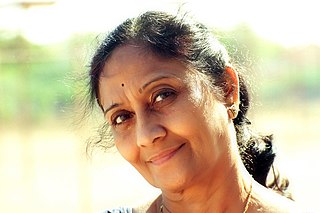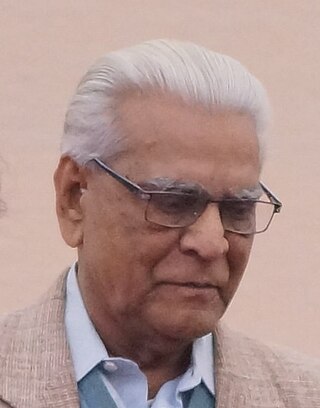Pannalal Nanalal Patel was an Indian author known for his contributions in Gujarati literature. He wrote more than 20 short story collections, such as Sukhdukhna Sathi (1940) and Vatrakne Kanthe (1952), and more than 20 social novels, such as Malela Jeev (1941), Manvini Bhavai (1947) and Bhangyana Bheru (1957), and several mythological novels. He received the Jnanpith Award in 1985. Some of his works were translated as well as adapted into plays and films.

Kumarpal Balabhai Desai is an author, critic, editor, journalist, columnist and translator from Gujarat, India. He studied and later taught at the Gujarat University. He is associated with several social and Gujarati literary organisations such as Gujarati Sahitya Parishad. He has written and edited more than hundred books including biographies and several works on Jainism. He was awarded the Padma Shri in 2004.

Suresh Hariprasad Joshi was an Indian novelist, short-story writer, literary critic, poet, translator, editor and academic in the Gujarati language. Along with his teaching career, he led the modernist movement in Gujarati literature. He was prolific writer and he transformed the field of literary criticism.

Chunilal Madia was a Gujarati author from Gujarat, India, primarily known for his novels and short stories set in rural Saurashtra. Recipients of several awards, he is considered one of the leading writers of Gujarati literature.

Dhirendra Pritamlal Mehta is a Gujarati novelist, poet, critic and editor who received the 2010 Sahitya Akademi Award for Gujarati language for his novel Chhavni.

Varsha Mahendra Adalja is an Indian Gujarati language feminist novelist, playwright and negotiator who won the 1995 Sahitya Akademi Award for Gujarati language for her novel Ansar. She is also a dramatist, writing for stage plays, screenplays, and radio.

Chandravadan Chimanlal Mehta, popularly known as C. C. Mehta or Chan. Chi. Mehta, was a Gujarati playwright, theatre critic, bibliographer, poet, story writer, autobiographer, travel writer and broadcaster from Vadodara, Gujarat, India.

Bhagwatikumar Sharma was an Indian author and journalist who wrote in Gujarati. Born in Surat and educated in languages, he edited a daily for several years. He wrote novels, short stories, poetry, essays and criticism. He received Ranjitram Suvarna Chandrak in 1984 and Sahitya Akademi Award in 1988.

Raghuveer Chaudhari is a novelist, poet and critic from Gujarat, India. He has also worked as a columnist for numerous newspapers, such as Sandesh, Janmabhumi, Nirikshaka and Divya Bhaskar. He was a teacher at the Gujarat University until his retirement in 1998. His most significant contributions have been in Gujarati language but he has also written Hindi articles. He received the Sahitya Akademi Award in 1977, for his novel trilogy Uparvas. He received Jnanpith Award, considered to be India's highest literary award, in 2015. In 2019, he was awarded a D.Lit. by Gujarat University.

Labhshankar Jadavji Thakar, also known by his pen names Lagharo and Vaidya Punarvasu, was a Gujarati poet, playwright and story writer from India. Educated in languages and Ayurveda, he taught at colleges before starting practice of Ayurveda. He had a modernist approach in literature and was heavily influenced by absurd theatre and the traditions of experimental literature. He chiefly wrote plays and poetry.
Shivkumar Joshi was a Gujarati language author from India. He was also stage actor and director. Born in Ahmedabad and lived in Calcutta, he was involved in literary activities. He wrote large number of plays, novels and short stories.

Dhiru Ishwarlal Parikh was an Indian Gujarati poet, short story writer and critic. He was an editor of Kavilok and Kumar, Gujarati literary magazines.

Chandrakant Sheth is a Gujarati poet, essayist, critic, translator and compiler from Gujarat, India. His pen names include Aryaputra, Nand Samavedi, Balchadra and Daksh Prajapati. He won the Sahitya Akademi Award for Gujarati in 1986 for his book Dhoolmani Paglio.

Radheshyam Sharma was a Gujarati language poet, novelist, short story writer, critic and compiler from the state of Gujarat, India. He is known in Gujarati literature for his experimental novels Fero (1968) and Swapnatirtha (1979). His other significant works include Aansu Ane Chandaranu (1963), and Gujarati Navalkatha, a work of literary criticism on Gujarati novels. Sharma was awarded the Gujarati literary honours Ranjitram Suvarna Chandrak, in 2004, and Dhanji Kanji Gandhi Suvarna Chandrak, in 1995.

Vinesh Antani is Gujarati novelist, short story writer and essayist from Gujarat, India.

Jayant Gokaldas Gadit was a Gujarati novelist, critic and professor from Gujarat, India. He received the Dhanji Kanji Gandhi Suvarna Chandrak in 2008 and was awarded the Gujarat Sahitya Akademi prize twice.
Rasiklal Chhotalal Parikh (1897–1982) was a 20th-century Gujarati poet, playwright, literary critic, Indologist, historian, and editor from Gujarat, India. He was the president of Gujarat Sahitya Sabha and was appointed the president of Gujarati Sahitya Parishad in 1964. He received the Sahitya Akademi Award in 1960 for his play Sharvilak. He is also a recipient of the Ranjitram Suvarna Chandrak and the Narmad Suvarna Chandrak.

Dhansukhlal Krishnalal Mehta was a Gujarati writer from Gujarat, India. He is considered a pioneer of Gujarati short stories. He is known for his humorous novel Ame Badha, co-written with Jyotindra Dave. He received the Gujarati literary awards Ranjitram Suvarna Chandrak in 1940 and the Narmad Suvarna Chandrak in 1957.
Koi Pan Ek Phool Nu Naam Bolo To is a 1967 Indian psychological-thriller play by Gujarati writer Madhu Rye.
Abhimanyu Acharya is an Indian short story writer and playwright from Gujarat, India. He received the 2020 Yuva Puraskar for his short story collection Padchhayao Vacche.

















